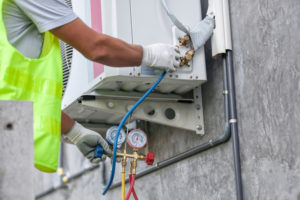
Maintenance work often goes hand in hand with construction work. Many specialty contractors and subs derive a substantial portion of their revenue from the service and repair side of their businesses. While mechanics lien laws provide the best tool available to the industry for securing payments on construction projects, do they apply to regular maintenance work? What about a repair job? Is there even any difference between the two?
What Exactly Is Maintenance Work?
This question is probably more puzzling than you’d expect, given that commercial maintenance and repair companies are fairly common across the United States. Many companies (especially chains) will have a maintenance provider available to go to their customers’ locations and fix things that break.
These companies fix walk-in coolers that stop working, repair ceiling tiles that are ruined by leaks, optimize air conditioning systems when they struggle to keep up, replace windows when they crack, and so on.
Let’s take the struggling air conditioning system as an example:
If your air conditioning system has trouble keeping up with the summer weather you’re going to call an air conditioning company. They will come to your property, diagnose the problem and either fix it with some repair or replace the system if the problem can’t be fixed.
If they replace your air conditioning system in full, we have a pretty cut and dry construction improvement situation. Your property used to have an air conditioning system that didn’t work. The property is then improved with the installation of an entirely new air conditioning system. The air conditioning company has improved the property, and they are clearly entitled to file a mechanics lien if unpaid.
Further reading: How to file a mechanics lien in every state
But what if they just repair the existing system? Maybe they just needed to clean out some debris that was stuck in the unit, or maybe a valve or some other connection wasn’t quite tight enough.
Is the repair of the system considered an “improvement to the property” (which is an essential requirement in order to qualify for lien rights protection)? What if the repair company doesn’t make any real fixes but instead just diagnoses the underlying problem? Is diagnosing a construction problem a qualification to file a mechanics lien?
Maintenance Work & Mechanics Lien Rights
In general, United States mechanics lien law does not distinguish between ground-up construction, total renovation, or a small-scale, construction-like task. Work that occurs in any of these areas is usually protected by a state’s lien laws.
Take things a step further and let’s think simply about maintenance and repair work. Many repair jobs could fall into the category of “small-scale, construction-like tasks” that we mentioned above. But do these maintenance tasks qualify for mechanics lien rights?
Further Reading
I’m a janitorial company and my customer won’t pay. What can I do?
Incorporation Is Key
Whether maintenance and repair work qualifies for mechanics lien rights will boil down to one primary issue: incorporation. Specifically, lien rights depend on whether the work was incorporated into the property.
In the air conditioning system example above, the maintenance work would probably qualify for lien rights, because of the fact that the air conditioning system is an integral, connected part of the building. There’s almost no way to perform any work on the system that won’t be incorporated into the property, because it’s almost impossible to separate the system from the property.
If the repair company was just fixing a window AC unit however, chances are that the work there would not qualify for mechanics lien protection.
Incorporation is a fundamental issue when determining lien rights of material suppliers, as well as for companies that manufacture specially fabricated materials for the construction industry.
As long as the work has something to do with a component part of the immovable property, the maintenance work performed will likely qualify for mechanics lien rights.